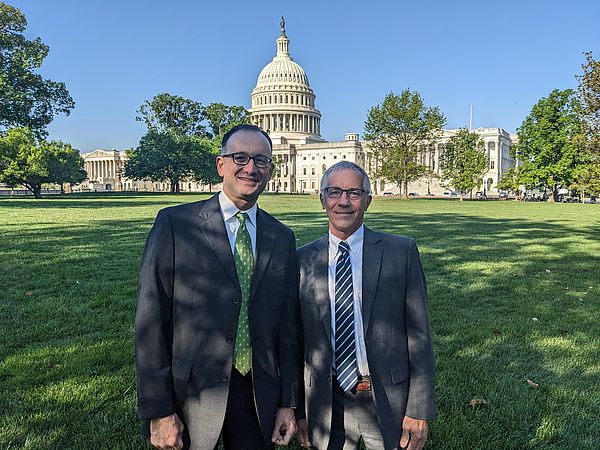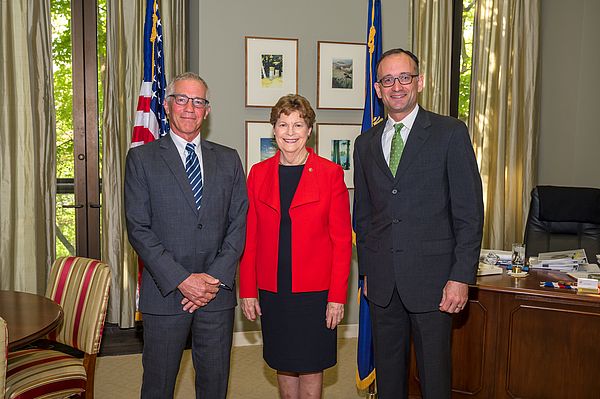Having worked for a land trust for the past 17 years, I am no stranger to climbing hills in springtime. This April, I had the opportunity to climb the Hill in Washington, D.C. to meet with New Hampshire’s Congressional delegation to discuss important federal land conservation legislation and policy issues. I went to Capitol Hill with three goals: To express my gratitude for the support New Hampshire’s land conservation community receives from our federal lawmakers; to urge them to support robust conservation funding in the next Farm Bill, now up for five-year reauthorization; and to educate them about what is and is not working in the federal conservation programs we use most.
I was not alone. Along with about 70 land trust colleagues from across the country, my visit was part of Advocacy Days, a week of in-person federal land conservation policy advocacy organized by the Land Trust Alliance. I also had the pleasure of being joined by Peter Kenyon, president of the Monadnock Conservancy Board of Trustees. Peter and I met with three lawmakers and members of their staffs – Senators Maggie Hassan and Jeanne Shaheen (pictured), and Congresswoman Ann McLane Kuster.
Our first job was to thank the senators and congresswoman for their consistently strong support for the many federal laws and programs that facilitate land conservation. For example, all three have long supported the income tax deductibility of donated conservation easements, which serves as a key incentive to landowners to conserve their land. We expressed particular gratitude for their support of the Conservation Easement Program Integrity Act, which stamped out a certain kind of abusive, fraudulent conservation easement donation scheme that enabled promoters and investors to turn conservation into a profit-making venture. Despite well-funded opposition, the law passed, and it now protects those of us doing legitimate conservation from being pulled down by a few bad apples. The offices of Senators Shaheen and Hassan and Congresswoman Kuster are deeply knowledgeable about these programs and laws, and Peter and I delivered our message of gratitude to willing and interested ears.
The timing of our visit was strategic, as Congress is just beginning negotiations on the Farm Bill – a massive package of legislation that funds nearly every facet of food production in the United States, from farm to fork. For reference, the 2018 Farm Bill called for approximately $428 billion in spending over its five-year life span. While the vast majority of Farm Bill spending is for the Supplemental Nutrition Assistance Program (SNAP, formerly known as food stamps), of particular importance to land trusts is billions in appropriations for farm and forest conservation programs, including the Agricultural Conservation Easement Program (ACEP), which we utilize extensively to fund farmland conservation in the Monadnock region. Because they have seen firsthand how important conservation is to New Hampshire’s quality of life, the senators and congresswoman readily agreed to advocate for strong funding for this and related conservation programs in the new Farm Bill.
Because our Congressional delegation was already so supportive of and knowledgeable about land conservation, we had the chance to dig deeper into other topics that affect our work, including where we see room for improvement. For example, the slow pace and frustrating bureaucracy of grant programs like ACEP mean that many of our conservation easement projects drag on for years before completion. Such delays pose grave risks of projects collapsing, as some landowners simply can’t afford to wait to be paid for their conservation easements, sometimes due to ill health or financial distress. We expressed the need for more streamlined and efficient processes, and we learned that much of the problem is due to too few federal employees to administer the programs. Overall, while we are currently blessed with an abundance of government funding for land conservation, there are increasing signs that the federal and state governments lack the capacity to deploy it on the ground in a timely manner. Nevertheless, the lawmakers and staffers with whom we met were highly receptive to our concerns and willing to seek solutions, both in the Farm Bill itself and in the agencies through which it is implemented.
Although I prefer a sturdy pair of hiking boots to my one and only business suit, my visit to Washington was productive and fulfilling. As I met with colleagues from land trusts from across the country, I was struck by how lucky the Monadnock Conservancy is to operate in a state where land conservation is still valued by politicians on both sides of the aisle. Other states are seeing a trend toward land conservation being dragged into existing political and cultural battles. As with many political fights, the truth gets hidden behind reductive talking points, but the reality is that land conservation is completely voluntary and not a government land grab. Most importantly, land conservation benefits everyone – hikers and hunters, young and old, farmers and city dwellers. We thank all lawmakers of any political party who recognize that conserving land is a gift to our children and grandchildren.

